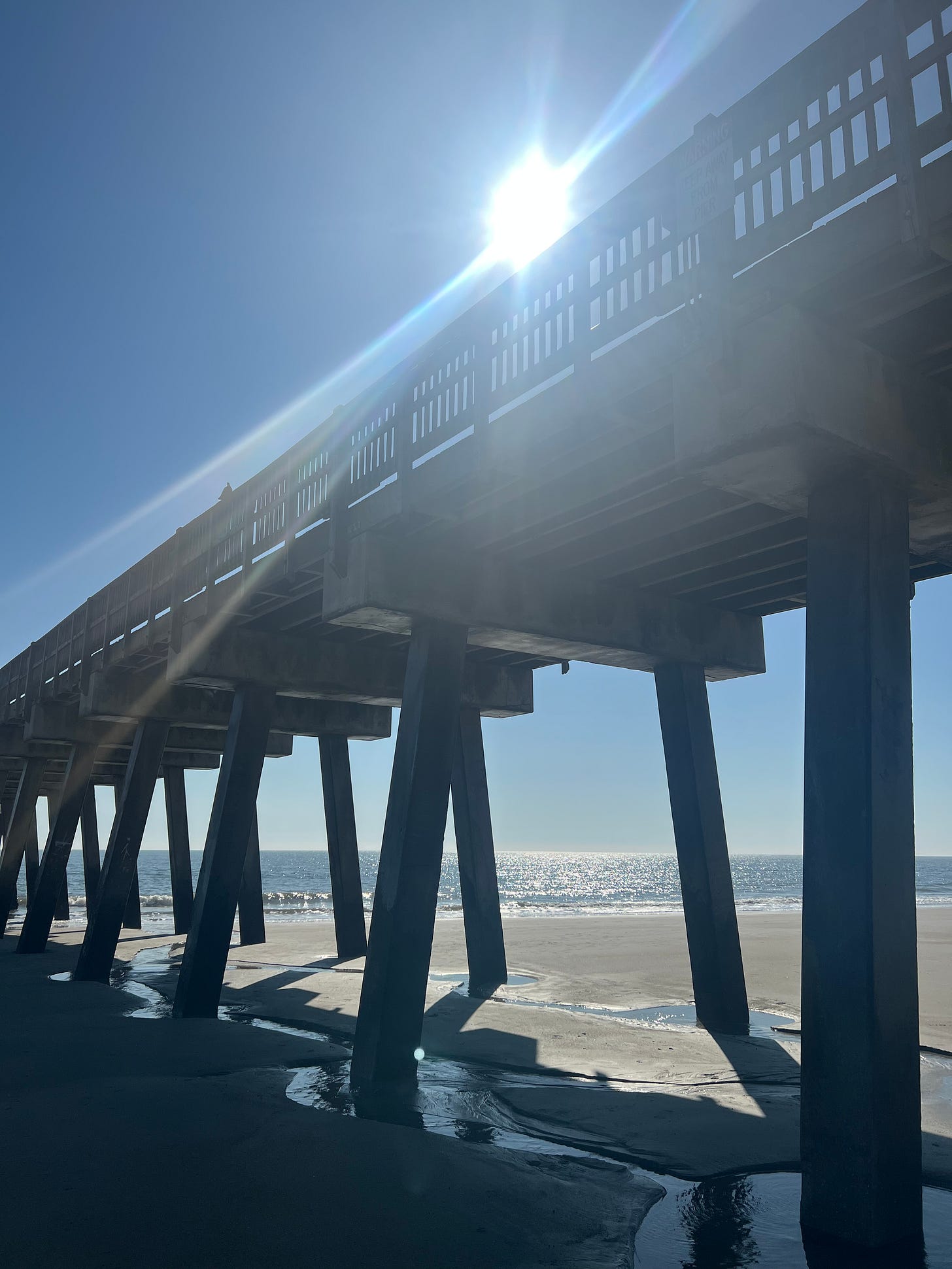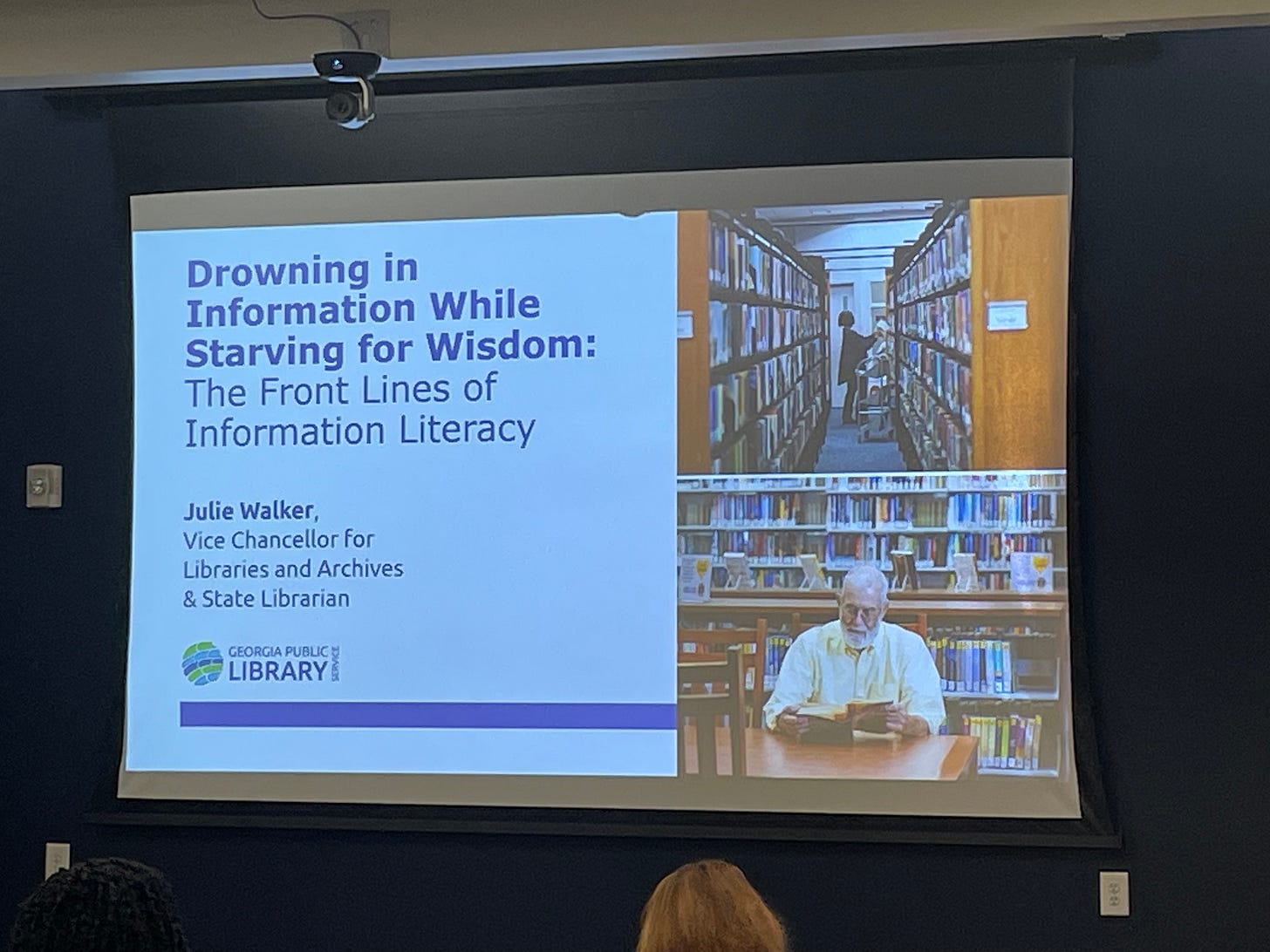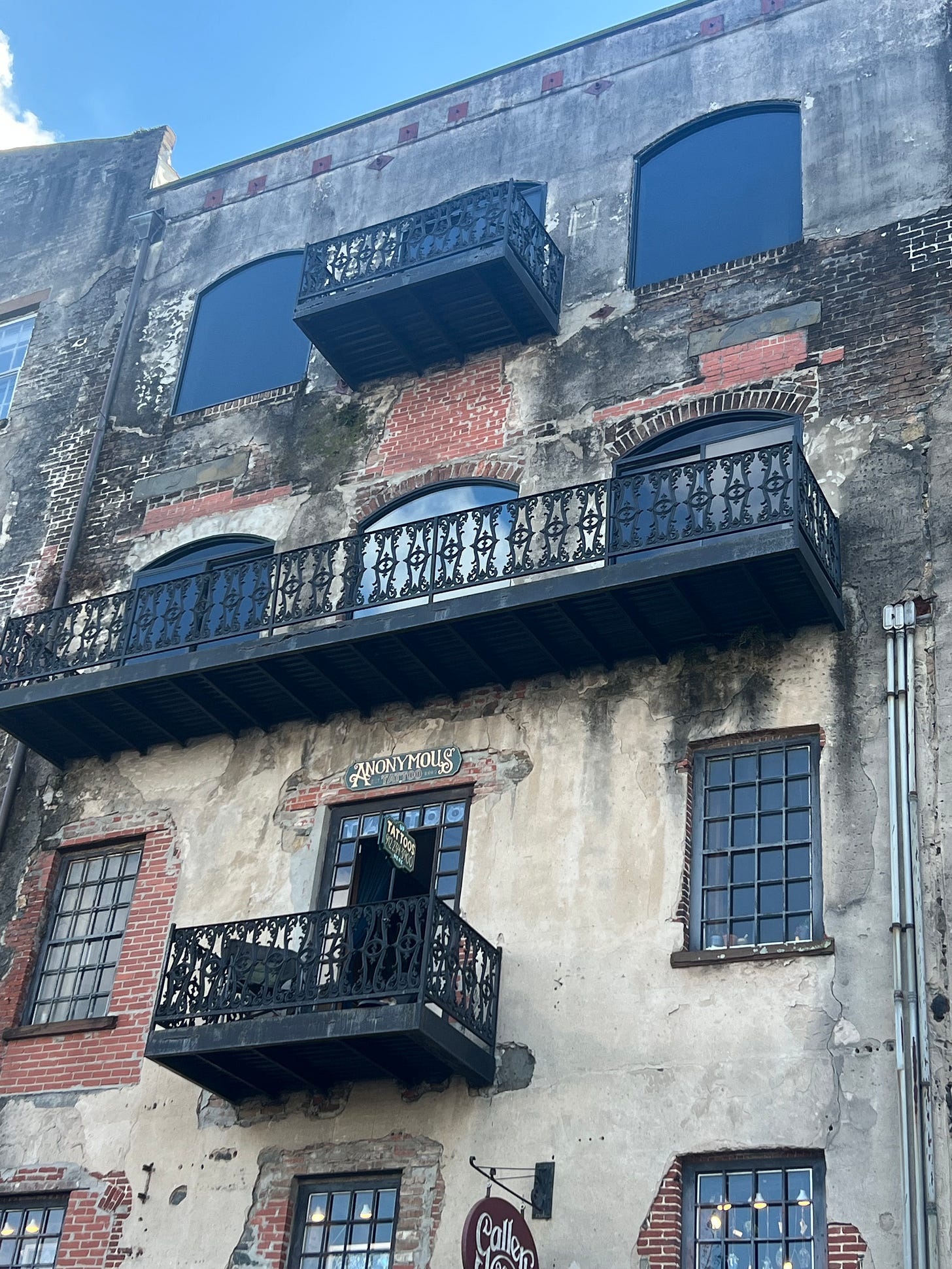GICOIL 2025 + MoC 2.0 = Info Lit 101
My weekend at the Georgia International Conference on Information Literacy in Savannah. Also, introducing Mind over Chatter 2.0!
Not that anybody really cares about expertise or “knowledge” anymore, but the experts say you’re supposed to re-introduce yourself at the beginning of each newsletter. It’s meant to help with recognition or re-establishing “mission” or something like that. So hi!
My name is Paul Cook and this is my semi-monthly newsletter. I mostly write about higher education and post-truth phenomena, but I also like to post in this space about professional updates (like my new book—did I mention I have a new book out and it’s my first one?), conferences or places I am traveling to (like in this post), and races and other events I am running or thinking about running. Occasionally, I post podcasts on Trump 2.0. For a while there I was trying to keep up with the firehose that is developments in artificial intelligence, but things got away from me.
This newsletter is 97.83% free. Most everything I post I actually want people to read, so I tend not to put most things behind a paywall. I also feel weird asking people to pay for my writing, even though it’s not that bad, and writers and artists should get paid. But I get it. That said, please sign up for a free membership. I promise I won’t judge you (too harshly) for not paying anything, and like I said, you’ll still get the majority of what I write here.
Happy Monday!
One more thing: I am presenting alongside my colleague and longtime collaborator Adam Maksl on Thursday, February 20 from 12:00pm to 1:30pm ET as part of IU Online’s 2025 Speaker Series. We will be talking about FutureIU, a grassroots movement of faculty and staff we started in 2023 that meets monthly every fourth Wednesday. The talk on Thursday is free and open to the public; all you have to do is register and click the link to join the webinar.
Spanish Moss, whispers of Forrest Gump, delicately fried cornmeal flounder and shrimp. Balmy, breezy evenings in early February. Mind-bending traffic plopped onto 1970s infrastructure. Welcome to the Lowcountry, a loose confederation of sea islands and beachy peninsulae that encompasses parts of coastal Georgia and South Carolina and stretches from Savannah on the southern end to Charleston in the north. You can’t roll down your window all the way without becoming intoxicated by the smell of fried seafood and magnolia blossoms.
Savannah is the oldest city in Georgia and the state’s first capital. It’s 300 years old, which by American standards is about as ancien regime it gets.
If there’s one thing I’ve learned from years of teaching and writing about new media and the digital classroom, it’s that “information literacy” is more than just a lofty academic-ey buzzword—it’s the very air we breathe in an age of 24/7 connectivity. So, when I stepped into the Georgia International Conference on Information Literacy, or GICOIL 2025—coffee in hand, curiosity on high alert—I felt that familiar, buzzing excitement of possibility.
GICOIL, with its eclectic mix of librarians, educators, and researchers, promised a deep dive into how we discover, evaluate, and use information. In other words, this was my kind of conference: an interdisciplinary space dedicated to both the theory and the everyday messiness of how knowledge gets shared and shaped in the sausage grinder that is our shared postdigital environment.
In her keynote address, Julie Walker, Georgia State Librarian and Vice Chancellor for Libraries and Archives of the University System of Georgia, tackled the thorny interplay between free expression (the first amendment) and the challenges of defining “misinformation” in a world inundated with digital noise. Walker began her talk by pointing to Trump’s newly signed executive order on “restoring freedom of speech” as a pivotal moment, quoting his remarks at the World Economic Forum: “No longer will our government label the speech of our own citizens as misinformation or disinformation, which are the favorite words of censors [also misinformation researchers like myself] and those who wish to stop the free exchange of ideas and, frankly, progress.”
Now, I don’t see myself as wishing to stop the free exchange of ideas and progress. In fact, I would argue vociferously that the study of mis- and disinformation enhances such an exchange of ideas and concepts. But perhaps Trump, in his infinite, cult-like wisdom, knows something I don’t. And perhaps I should exhibit more intellectual humility.
Walker further noted in her keynote that Trump hailed this move as “historic,” asserting it has “saved free speech in America.” Yet she also encouraged the audience to consider whether the mere act of refusing to label problematic content as “disinformation” truly fosters an environment for open discourse—or if it instead creates new risks for those seeking factual accuracy and responsible scholarship. (Well, duh.)
My book argues for something I call misinformation studies. The main thrust of my proposal is that the problem of mis- and disinformation has, in the digital age, mutated and expanded to such a degree—both in terms of scale and quality—that we need to make it a primary focus of what we do in higher education: epistemologically, pedagogically, and pragmatically. And the only responsible and sustainable way to do this, I argue, is to make misinformation and disinformation the center of what we do and how we talk about knowledge and its pretenders and detractors. Why? Not only because mis- and disinformation and post-truth phenomena are THE biggest problems facing US democracy today (one particularly terrifying article from last week suggests that Gen Z can’t separate factual info from AI garbage), but also because disciplinarity is the engine of academia and academic exploration.
If we want to move the needle on what is, at base, an epistemological problem (i.e., a problem of knowing and belief), then we have to harness the power of the academic disciplines. Misinformation studies, as I sketch it in the book, promises to do just that. Anyway, this sort of approach is anathema to the kind of political “freedom of speech” Trump wants to champion, which is (to be clear) nothing more than censorship of left-leaning views. But we must remember, too, that Trump is a mere symptom of this crisis of knowledge, not its origin.
Donald Trump's executive order on "Restoring Freedom of Speech” was framed as a defense against censorship, particularly on college campuses and social media platforms. However, in practice, it reinforces the growing problem of mis- and disinformation by essentially conflating protected speech with the right to spread falsehoods without consequences. This order emboldens bad-faith actors who seek to spread misleading narratives under the guise of free expression. One striking example of this phenomenon can be seen in the misinformation surrounding the Kansas City Chiefs, particularly in politically charged contexts. Following their recent Super Bowl wins, and the way Taylor Swift has been sort of glommed on to the team’s image, conspiracy theories have circulated claiming the team’s victories were "rigged" in favor of liberal narratives or that the NFL is manipulating outcomes to support certain political figures—narratives that mirror the disinformation tactics seen in Trump’s own rhetoric about election fraud and pretty much everything else.
The Chiefs have frequently been drawn into culture war battles over the last couple of years, often becoming an unintended proxy for broader political grievances. After their victory in 2024’s Big Game, misinformation surged online suggesting that the game had been fixed to benefit Taylor Swift and her rumored liberal influence, with some even going so far as to claim the NFL had coordinated with the Biden administration to engineer a feel-good sports moment ahead of the election. Disinformation like this thrives in environments where the boundaries between free speech and deliberate deception are blurred—exactly the kind of landscape Trump's executive order helps foster. By framing all speech as equally valid, regardless of its factual accuracy, the order inadvertently creates more space for baseless conspiracy theories to gain traction. The Trump administration’s actual goal is to further entrench public skepticism toward institutions, whether in politics, media, or even professional sports. Liberals are now saying that the left’s desire to prop up institutions was a sizable part of its downfall in the 2024 election.
And yet, institutions are what made America great the first time. In their bid to “Make America Great Again,” the Trump administration, by which I mean Donald Trump and his pal Elon Musk, are taking a fire ax to the federal bureaucracy.
Nir Evron, in a recent opinion piece in the Chronicle, writes
Nonacademics often dismiss a discussion by calling it “merely academic,” by which they mean it is theoretical or speculative, lacking immediate practical implications. But conducting such debates is our profession’s main reason for being. Modern colleges are secular shrines to curiosity for curiosity’s sake. They make possible discussions free from utilitarian demands, practical exigencies, and real-world constraints. The existence of such spaces is a precious, fragile, and relatively recent achievement, barely 150 years old. Undermining it by turning our institutions into activist hubs would not only be a profoundly self-defeating move but also a significant loss to society as a whole. (emphasis added)
This passage expresses a familiar refrain in higher education that colleges and universities exist as “secular shrines to curiosity for curiosity’s sake,” free from the pressures of the so-called real world. This is an unabashedly romantic perspective, and a deeply misleading one—particularly in the postdigital era, where the boundaries between academic knowledge and public discourse, between online and offline discourses, are increasingly porous. The idea that universities can or should remain insulated from practical concerns ignores a fundamental reality about the nature of post-truth phenomena: misinformation does not respect institutional walls. It circulates through the same digital networks and information ecosystems that shape public trust in expertise, science, politics, and education itself. Those of us still working in higher education have a duty, I believe, to not only analyze misinformation but to actively equip students with the tools to navigate and counter it. This is not about turning the university into an “activist hub,” but about recognizing that critical engagement with misinformation—and indeed all information, all knowledge that is vital to the healthy functioning of society—should be central to higher education’s mission in the postdigital era. Universities do not get to sit on the sidelines while the epistemic ground beneath us shifts, and there are centuries of precedent for this in the history of the university as a modern social institution.

Universities, like cargo ships, have enormous turning radiuses. As institutions, they are not immune to change, but change happens slowly and deliberately in the country’s colleges and universities. To suggest that addressing misinformation somehow threatens the integrity of academic inquiry is to misunderstand both the nature of misinformation (and knowledge itself) and the role of the university. Teaching students to interrogate sources, analyze rhetorical strategies, and distinguish between knowledge and propaganda is not activism—it’s foundational to intellectual rigor. The real danger lies not in engaging with these challenges, but in pretending that misinformation is someone else’s problem. If we cling to an outdated model of academia as a space untouched by “practical exigencies,” we abdicate our responsibility to the very thing we claim to protect: knowledge itself. In an era where the stakes of information literacy are higher than ever, higher education must reject the false binary between curiosity and real-world engagement. The work of the university is not to retreat from the world but to help shape a more informed and discerning public.
Trump lives in a fantasy land. No big surprises there. Like the president’s war on DEI, the Department of Education, and democracy itself, we are at a watershed moment in the history of the Republic.
One final note before I take off. I am pleased to share the new and improved Mind over Chatter 2.0 Canvas modules, available through IU Expand. I originally developed these award-winning modules alongside several colleagues here at IU Kokomo in 2019; for the last year or so, I've been hard at work revising the original five modules and adding two brand new ones: one on artificial intelligence and another on Postdigital Future/s. Each module takes around 25 minutes to complete, and the modules themselves deal with everything from helping students understand cognitive biases (like mere exposure effect, the Dunning-Kruger effect, etc.) to discovering the myriad ways digital media shape our lives and influence our beliefs.








